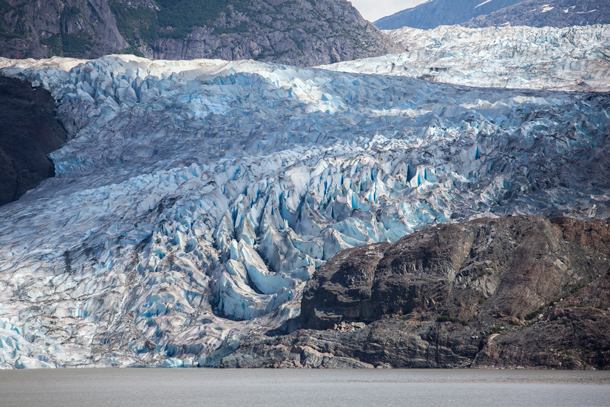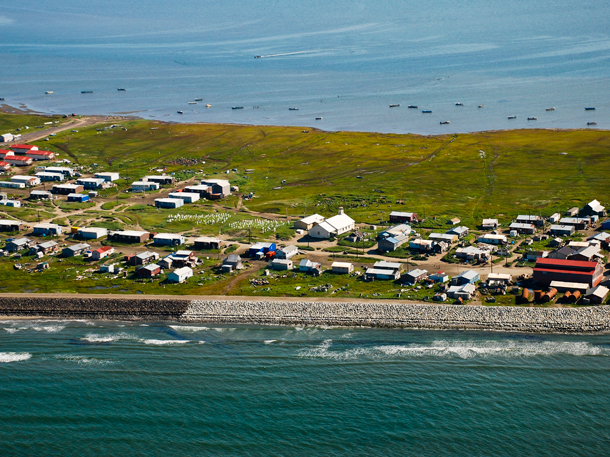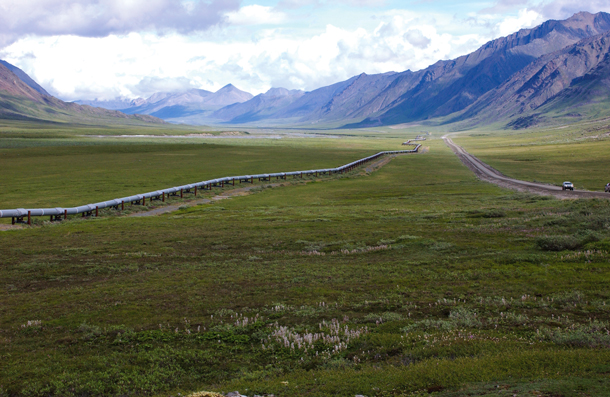Alaska Youth Sue to Fight Climate Change
Air Date: Week of May 11, 2018

The Medenhall Glacier near Juneau, Alaska has been receding rapidly since the mid-20th century as a function of global warming. Warming in the polar regions of the world, including Alaska, occurs twice as fast as in the rest of the world. (Photo: Jeff’s Canon, Flickr CC BY-ND 2.0)
16 young people are suing their home state of Alaska for failing to protect their constitutional right to a healthy environment. They argue the state must reduce greenhouse gas emissions though most of Alaska’s earnings depend on oil production. Host Steve Curwood discussed how this complicated suit might develop with Vermont Law School Professor, Pat Parenteau.
Transcript
CURWOOD: The State of Alaska is seeing the fastest rise of temperatures in the US linked to climate disruption, with melting permafrost and rising seas washing away seaside communities. At the same time Alaska’s extensive and lucrative oil business is a key source of global warming gas emissions. So young Alaskans concerned about their future are fighting back. Sixteen of them have sued the state and key officials for failing to protect their right to a healthy environment now and in the future. Lawyers from the nonprofit Our Children’s Trust are supporting this suit, and similar ones in other jurisdictions. Vermont Law School professor Pat Parenteau keeps a close watch on the growing number of youth climate cases – and he’s on the line now – welcome back to Living on Earth, Pat!
PARENTEAU: Thanks, Steve. Good to be here.
CURWOOD: Now I understand that Alaska has a provision in its constitution that ensures the right of people to a healthy environment. In your view, what does this provision really require of the state?
PARENTEAU: Well, that's the big question that's been pending before the courts in Alaska right now; there is language in the Constitution that suggests that everyone in the state has a right to life, liberty, property, and that has been interpreted by the Alaska Supreme Court to include a healthy environment. The Constitution doesn't use those words, but they've been implied as unenumerated rights but the court in Alaska hasn't fleshed out exactly what that means and what obligations it might impose on, for example, the government.
CURWOOD: And what is the makeup of the Alaska Supreme Court to the extent that we can understand it at a distance?
PARENTEAU: I think it's fair to say that it's a moderate court. It's not known as a particularly progressive court, but on the other hand it's not reactionary. It's been open to arguments about how to interpret and apply the Constitution, but it's a cautious court. It's not inclined to get too far out in front in terms of interpreting constitutional rights.
CURWOOD: And talk to me about the plaintiffs who are involved in this lawsuit, it's called Sinnok v. the state of Alaska. Who are they and what exactly do they want in their lawsuit?
PARENTEAU: So, there are 16 plaintiffs of various ages, some quite young and some in high school and right up to the college level. Some of them are native Alaskans, quite a few of them. They're from various parts of Alaska. The complaint that was filed in the case goes into great detail actually on the individual youth plaintiffs and how precisely they're affected by the changes that they're seeing in their life every day. One of the - the lead plaintiffs in the case in fact has talked about how his village that's on the seashore is eroding and how he's concerned about sea level rise and the impact on his community.

Esau Sinnok, the named plaintiff in the Sinnok v. State of Alaska case, is from Shishmaref, Alaska. Shishmaref, pictured above, is one of many coastal towns and islands that are facing threats from erosion and sea level rise, as a result of rapid climate disruption. (Photo: Bering Land Bridge National Preserve, Wikimedia Commons CC BY 2.0)
The plaintiffs, once again as they are in some of these other climate change cases are seeking some pretty sweeping, both declarations of their rights under the Constitution and how those rights are being infringed by both what the state of Alaska is doing and not doing, but they're also asking for a science-based plan of attack or a plan of how to deal with climate change through reducing greenhouse gas emissions based on what the science requires and that's something on the order of eight percent per year reduction in emissions plus an accounting of the emissions that the state is responsible for, and how fast they're being reduced. So, pretty broad sweeping remedies they're seeking.
CURWOOD: And who are the defendants in this case? I imagine it's the state?
PARENTEAU: The state of Alaska, the governor of Alaska, many of the leading agencies, the Department of Environmental Conservation and so forth are all defendants in the case.
CURWOOD: So, to what extent is the state arguing that the science doesn't compel action at this point?
PARENTEAU: They're not making the science argument at all, in fact, the complaint in the case cites many different statements by the state legislature, by the governor, by the agencies acknowledging that climate change is real, acknowledging it's causing severe problems for Alaska, acknowledging the need to reduce emissions. But then of course the documents stop after acknowledging all that and they're not taking any specific actions to reduce. They're taking the opposite actions. The argument that the state is making is that - not that the science doesn't require action, - but that Alaska is in a very difficult position and would have to be sacrificing income and culture and health care and on and on, a lot of social services, if it were to suddenly or dramatically begin curtailing the one major product that it can export which is fossil fuels. So, having acknowledged all this, the state is sort of stuck in the position of saying, yeah, we know we need to be doing something, we just don't know exactly what that is or how to go about it without causing major social disruptions by curtailing development of these resources.
CURWOOD: This is a tough case in a state, that is, if there's any state that’s addicted to oil, it has to be Alaska. The state has great interest in the pipeline, a bunch of wells up on the North Slope for oil and gas. It's big business up there; in fact, Alaskans get a - a dividend every year. They get a check based on the royalties. How popular do you think this lawsuit is in Alaska?
PARENTEAU: I don't know that there's been any polling on it, but if there was I'd be surprised if it enjoyed much support. You're right, I mean, fossil fuels, oil and gas are the lifeblood of Alaska, and if anything they're pressing for greater expansion and into the Arctic National Wildlife Refuge, offshore, onshore, everywhere they can find major deposits. Both the representatives in Congress, Senator Murkowski and others, pushing very strongly for Alaska to continue to develop its oil and gas resources. So, you have a juxtaposition here of a state that's suffering, probably what you’d call disproportionate impacts from climate change at the same time they're accelerating the development of the fuels that are going to exacerbate those very impacts. But the question for the court is going to be all of that being true, what's the role of the court in ordering the government to take action as opposed to waiting for the legislative and executive branches of the government to actually start the process at least of taking action? That's kind of where we're picking up the action in this lawsuit.
CURWOOD: And I'm imagining that that was the basis of throwing out a similar suit going back a few years?
PARENTEAU: It was, and the state in this case is saying, “Here they are the plaintiffs are back again with essentially the same arguments and the same request of the court that was rejected by the Supreme Court.”

The state of Alaska is friendly to oil, since the vast majority of the Alaskan economy relies on fossil fuel production. Above, the Trans-Alaska Pipeline runs through the Brooks Range of northern Alaska. (Photo: U.S. Geological Survey, Flickr public domain)
I think the earlier case was dismissed in 2014 and I think the plaintiffs in this case are facing a difficult challenge because the one difference between this case and the earlier case is that the plaintiffs did file a petition with the agencies in Alaska seeking broad scale rulemaking and policies to address real reductions in emissions. That petition was denied, and so the plaintiffs now are saying to the court, “You instructed us to try to seek relief from the state agencies, we did that, we got nowhere with that, we're back to you saying we're stuck at this point. We can't get the legislature to move, we can't get the agencies to move. The courts are our last resort. Will you now take action?” So, that's what the plaintiffs have said is, “We tried the other route, the political route it didn't work. Things are getting worse, we need relief”.
CURWOOD: And how does this compare to the other cases who we see now in the US, the federal case in Oregon, more recently there's been a matter brought in the state of Florida. What does this trend say? What does this trend mean?
PARENTEAU: It's testing these theories which are very similar against a body of state law, in different states as you just mentioned, and so it's probing, it's trying to find a breakthrough case where you can find a state supreme court willing to make a really bold decision finding not only a right to a healthy environment, or a safe climate, stable climate, but also finding a duty on the part of the government to take real tangible action to address that.
It's like what happened in Pennsylvania when the Pennsylvania Supreme Court finally interpreted the state constitution to actually mean that local communities can block, for example, fracking operations in the Marcellus Shale seeking to extract oil and gas and saying that these communities and the people that are affected have a right to at least contest these kinds of developments. We have yet to see where any of these oil and gas operations have been stopped as a result of these constitutional rights that have been recognized, but at least the Pennsylvania Supreme Court has put down a very strong marker that there could be a limit to how far you can go pushing extraction of fossil fuels that are causing these various kinds of impacts.
CURWOOD: Pat Parenteau is a Professor at Vermont Law School. Thanks for taking the time with us today, Pat.
PARENTEAU: Thank you, Steve.
CURWOOD: Speaking for the state of Alaska and Governor Bill Walker, Assistant Attorney General Sean Beausang said the suit should not be allowed to go to trial.
He told the court, “Alaska is not destroying the environment. Alaska is not causing climate change.'"
Links
Living on Earth wants to hear from you!
Living on Earth
62 Calef Highway, Suite 212
Lee, NH 03861
Telephone: 617-287-4121
E-mail: comments@loe.org
Newsletter [Click here]
Donate to Living on Earth!
Living on Earth is an independent media program and relies entirely on contributions from listeners and institutions supporting public service. Please donate now to preserve an independent environmental voice.
NewsletterLiving on Earth offers a weekly delivery of the show's rundown to your mailbox. Sign up for our newsletter today!
 Sailors For The Sea: Be the change you want to sea.
Sailors For The Sea: Be the change you want to sea.
 The Grantham Foundation for the Protection of the Environment: Committed to protecting and improving the health of the global environment.
The Grantham Foundation for the Protection of the Environment: Committed to protecting and improving the health of the global environment.
 Contribute to Living on Earth and receive, as our gift to you, an archival print of one of Mark Seth Lender's extraordinary wildlife photographs. Follow the link to see Mark's current collection of photographs.
Contribute to Living on Earth and receive, as our gift to you, an archival print of one of Mark Seth Lender's extraordinary wildlife photographs. Follow the link to see Mark's current collection of photographs.
 Buy a signed copy of Mark Seth Lender's book Smeagull the Seagull & support Living on Earth
Buy a signed copy of Mark Seth Lender's book Smeagull the Seagull & support Living on Earth

